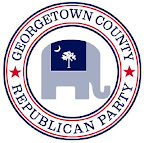School Politics- Partisanship didn't hurt public-education debate in Georgetown County
March 29, 2008
Below is an editorial from today's Sun News that highlights the need for Georgetown County school board elections to remain partisan- a position the Georgetown County Republican Party has vigorously supported.
EDITORIAL
School Politics
Partisanship didn't hurt public-education debate in Georgetown County
As part of its recent voting-rights settlement with the U.S. Justice Department, candidates for the Georgetown County Board of Education will run on a nonpartisan basis, beginning this year. No longer will school board ballots identify school board candidates as Republicans and Democrats.
This is OK. But in comparison with the main issue the Justice Department sought to address in forcing this change in the school-board electoral system, partisanship - let's face it - was a side issue.
The main issue, of course, was that the county's at-large school board voting system has tended, in recent years, to disenfranchise black voters. Under the settlement, which will take effect once the S.C. General Assembly "blesses" it, seven of the nine Georgetown County school board members will serve schoolchildren from single-member districts. Those districts will be drawn from the County Council district map. Only two school board members will be elected at large - by all county voters.
That change should address the Justice Department's main concern: that black school-board candidates be able to win elections. Because of shifting demographics and - yes - because of the rise of the Republican Party in Georgetown County, the at-large system now passing into history has yielded all-white school boards in the past two elections.
Since 2004, board members tended to be from the Waccamaw Neck and the city of Georgetown, where Republican strength is greatest. Black Democratic candidates have been unable to win elections. So it's understandable why some saw partisanship as part of the problem.
The problem with the end of partisanship, as county GOP Chairman Tom Swatzel has pointed out, is that school board candidates could have trouble distinguishing themselves from one another on the issues. There is no better instrument for honing and presenting political issues than a political party. There is no better instrument for getting voters interested in the issues - including education issues - than a political party.
We know: Swatzel's thinking runs afoul of the view that school board elections are somehow above politics. Not for nothing did a spokeswoman for the S.C. School Boards Association recently reiterate her group's position that school boards should be nonpartisan. "Education," she said, "is a nonpartisan issue."
This is fantasy. The Georgetown school board incumbents who stand for re-election later this year will still have party affiliations - and partisan feelings - even though they're technically nonpartisan. And the black candidates who run for the school board in hope of securing one of the new district seats are still likely to be Democrats - and feel like Democrats - even though they're technically nonpartisan.
Moreover, it's possible - even desirable - to apply "Republican" and "Democratic" principles to public education. Republican school board members, for instance, are more likely to be budget hawks than Democratic members.
None of this is to find fault with the deal as cut with the Justice Department and blessed by the federal courts. It's time to move on in hope that black voting power in Georgetown County will find fairer expression in future school board elections. But Swatzel is not wrong to express regret that partisanship will no longer directly shape the public-education debate in Georgetown County.
